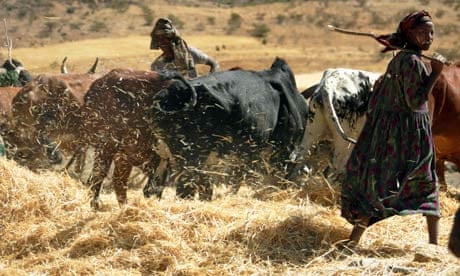Later this month, a new director-general will be chosen to take over the reigns of the UN agency tasked with tackling world hunger and coordinating the global response to food insecurity - the Food and Agriculture Organisation (FAO).
On 26 June, a majority of votes will elect the new FAO chief in a secret ballot. The six candidates, each nominated by his government, are: Franz Fischler (Austria), José Graziano da Silva (Brazil), Indroyono Soesilo (Indonesia), Mohammad Saeid Noori Naeini (Iran), Abdul Latif Rashid (Iraq) and Miguel Ángel Moratinos Cuyaubé (Spain). Whoever wins the vote will have from 1 January 2012 to 31 July 2015 to make his mark (and, under recent reforms, will be eligible for only one additional four-year mandate). The current FAO chief, Jacques Diouf (Senegal) has led the UN food agency since 1994.
Faced with the huge problem of how to feed the world, the new chief will have a tough few years. Where do you start, and what do you prioritise in your first year?
In this month's Global development podcast, Jayati Ghosh, economist and professor at New Delhi's Jawaharlal Nehru University, said the new FAO chief should focus on "reducing the impact of corporate power in changing cultivation and consumption patterns and improving the viability of small agriculture." Charles Godfray, Oxford professor and chairman of the expert committee behind the Foresight Global Food and Farming report, said the new FAO director should become the standard-bearer for transparency in the global food trade. "Until we have that transparency," said Godfray, "we can't get the commodity markets to work properly. And the commodity markets, if they work properly, are actually very helpful for food security."
Meanwhile Barbara Stocking, chief executive of Oxfam GB, said she wants the new director should push the FAO's knowledge base from theory into practice: "What I would like to see is the new director-general saying 'I want our best people out there, on the ground, helping governments set their own policies in food, helping them get their extension services working to do the very best thing by small farmers.'"
Last month, Lawrence Haddad, director of the Institute of Development Studies in Sussex, argued that while each of the candidates talk about results, none actually say which results they think really matter or how they plan to track progress.
Jose Graziano da Silva, who served as minister of food security under the Brazilian president Luiz Inácio Lula da Silva, and helped push forward the country's much-admired Zero Hunger Initiative (Programa Fome Zero), said last week that vulnerable countries should learn from each other and find new ways to use global food crises to stimulate small-scale farming and increase resilience to future price shocks. Commenting on the Guardian's Global development website, Graziano da Silva said, for example, that he's advocated countries adopt policies that redistribute revenue from particularly profitable sectors (especially mining and oil) in ways that stimulate domestic agriculture. Other tools in his kit include targeted cash transfers, food banks and public food purchasing programmes.
Whoever wins the vote will have a difficult job ahead, one of which will be convincing wavering donors – such as the UK – of the FAO's relevance. In its multilateral aid review earlier this year, the UK's Department for International Development named the FAO as one of four poorly performing bodies to be put under "special measures," insisting it move swiftly to improve its value for money. "Profound culture change is needed to transform FAO into a modern, transparent and accountable institution – particularly at country level," said the review. "The scale of reform needed to turn FAO into a consistently performing and effective organisation is huge. Much depends on whether the new DG will bring new impetus to reform." And earlier this year, Harvard professor Calestous Juma said the FAO was irrelevant to contemporary challenges and that "there are many 21st century agricultural leaders but it would be cruel to hoist them at the apex of a 20th century organisation like the FAO".
So what do you think? Take a look at our food security coverage and have a listen to our podcast. Let us know what you think should be top of the to-do list for the UN food agency's future chief.
And, as always, if you have any problems posting a comment, or if you would prefer to comment anonymously, email us at development@theguardian.com and we'll add your thoughts to the debate.

Comments (…)
Sign in or create your Guardian account to join the discussion